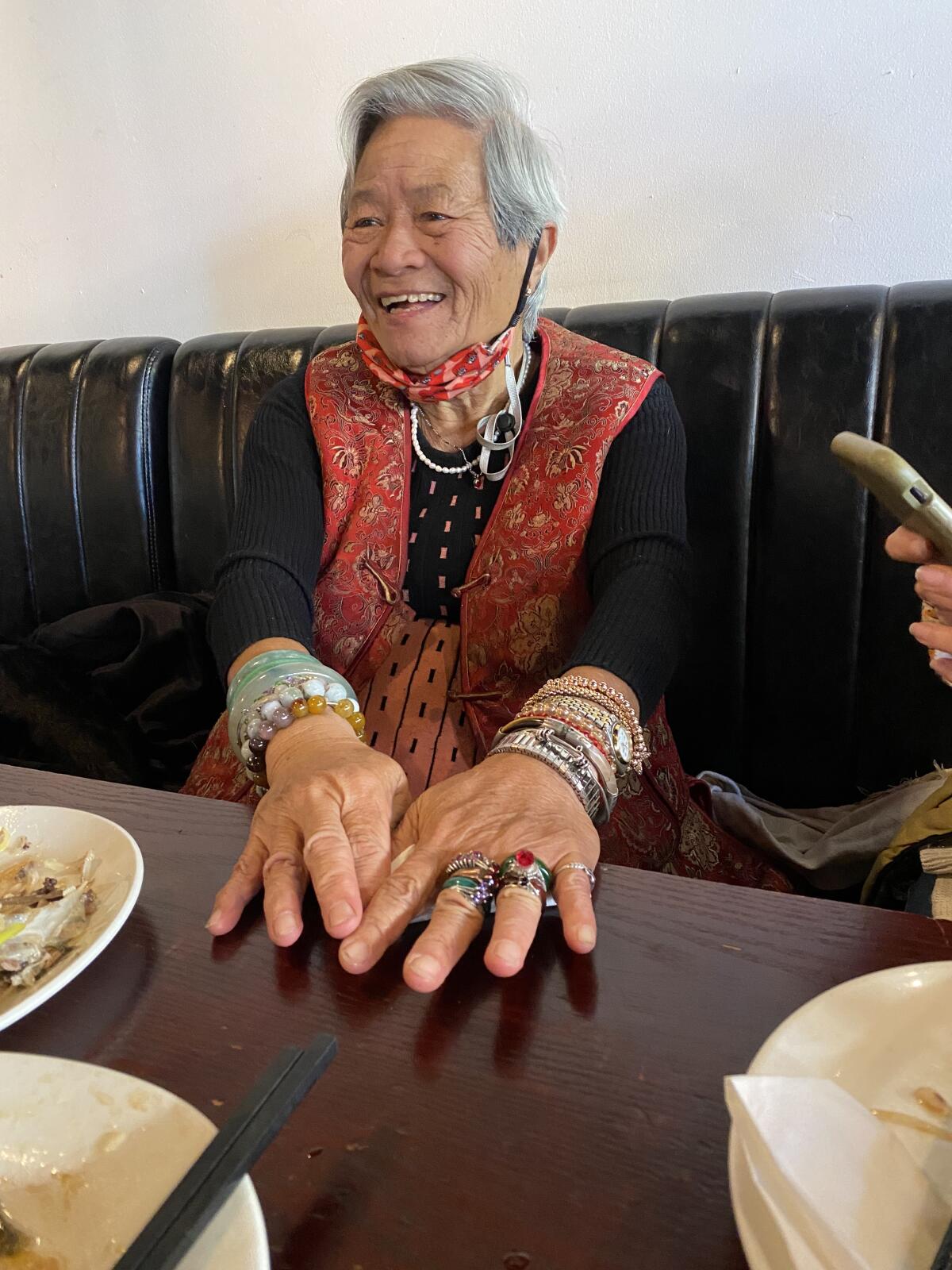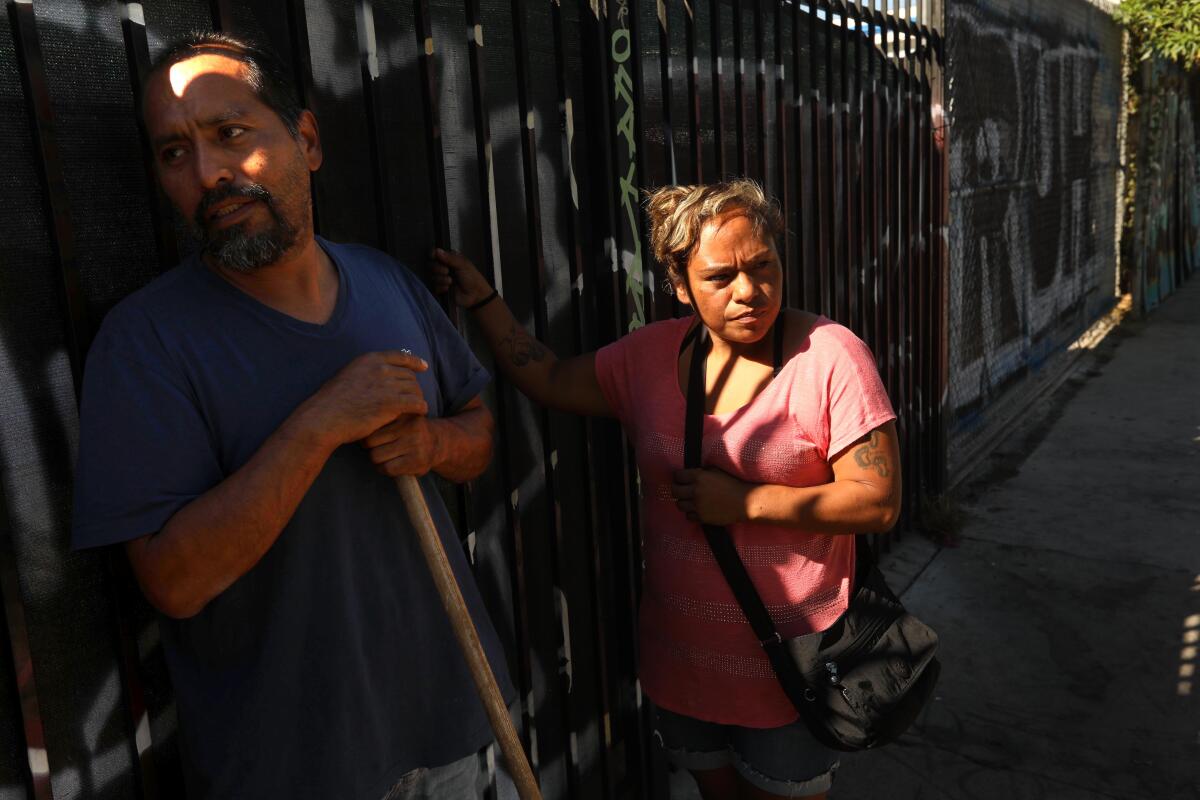Fading memories of Chinatown

- Share via
Good morning, and welcome to the Essential California newsletter. It’s Friday, Oct. 28. I’m Frank Shyong, a columnist writing about race, immigrant communities and diaspora.
Sometimes around Chinatown I run into a woman in her late 80s named Pauline Chau. She’s always lugging one of those grocery carts that roll like a suitcase, wears a ton of jewelry, and everyone in the neighborhood knows her. Some people call her the unofficial mayor of Chinatown because she knows everyone’s name. And also because she has this weird ability to take charge of any situation even when she doesn’t speak the language.
I had lunch with Pauline once at East Garden Restaurant after reporting a column on the loss of Chinatown’s swap meets. She ordered a massive fish — it wasn’t on the menu, but she’s friends with the staff and they knew the drill. When it came, she went straight for the head and eyes — the most nutritious parts, according to conventional Asian auntie wisdom.
She’s lived in Chinatown for more than 52 years, and for the last few years she has been serving as a tenant leader in the organization Chinatown Community for Equitable Development, fighting for businesses and housing that area seniors needed.
I haven’t seen her lately, and according to her friend, the Chinatown activist King Cheung, she moved to a senior living facility in Long Beach because she needed extra help.
Pauline’s Chinatown is fading fast. The last few years have left the neighborhood without a grocery store, a hospital, and most of its commercial indoor malls.
Most painfully, even the neighborhood’s senior housing complexes are endangered by the exploding value of the real estate they were built upon.
Conditions at Cathay Manor, one of the last senior homes in the area, have been declining for years. The building’s owner, the Chinese Committee on Aging Housing Corp., and its CEO and president, Donald Toy, face 16 criminal charges for failing to maintain the federally subsidized housing complex.
Now, according to a story by my colleague Connor Sheets, Toy and the building’s owners want to sell the place for $108 million, which would come with a 146% increase in rent, to $2,700.
Most of Cathay’s residents are on fixed incomes and can’t pay that much.
Just as a family needs its grandparents, a community like Chinatown needs its senior residents. They embody the neighborhood’s history and connect us to our past. Plus, they’re the only ones who really remember how to celebrate Chinese traditions — the details of which get pretty fuzzy in later generations, as I can attest to.
I think that one of the most important metrics of success or progress in society is how we care for our most elderly members. And by that measure, we are failing Chinatown.
And now, here’s what’s happening across California:
L.A. STORIES

Rising homelessness among Latinos. Hit by pandemic’s economic disruption and a shortage of affordable housing, more Latinos are falling into homelessness. Los Angeles Times
A beloved Salvadoran market with an uncertain future. “It’s very difficult,” said Berta Mendez, a vendor of Salvadoran staples on Vermont Avenue between 11th and 13th streets. “Estamos perdiendo.” We are losing. Los Angeles Times
Hollywood-adjacent. I found myself at an open mike in Tarzana, where dreams live, die and mature. Los Angeles Times
Check out "The Times" podcast for essential news and more
These days, waking up to current events can be, well, daunting. If you’re seeking a more balanced news diet, “The Times” podcast is for you. Gustavo Arellano, along with a diverse set of reporters from the award-winning L.A. Times newsroom, delivers the most interesting stories from the Los Angeles Times every Monday, Wednesday and Friday. Listen and subscribe wherever you get your podcasts.
POLITICS AND GOVERNMENT
Massive spending on campaign advertising. Businessman Rick Caruso is expected to sink $53 million into ads, spending 13 times more than his opponent, Rep. Karen Bass. Los Angeles Times
Suburban voters are “fed up.” Reporter Tyrone Beason checks in with voters in the San Fernando Valley and beyond, where faith in democratic institutions has eroded. Los Angeles Times
Caruso’s Latino voters. Times columnist Gustavo Arellano closely observes mayoral candidate Rick Caruso’s interactions with his Latino base, finding that “his appeal to Latinos is real.” Los Angeles Times
CRIME, COURTS AND POLICING
California lawyers don’t have to report peer misconduct. California’s legal community has long resisted a mandatory reporting law, a requirement that exists in some form in every other state. Los Angeles Times
From teacher to lawyer to Mexican Mafia fixer. Reporter Matt Ormseth tells the story of a criminal defense attorney who began to work with members of the Mexican Mafia. Los Angeles Times
Sacramento police lead the state in pursuits. A Sacramento Bee investigation finds that since 2018, 69 Sacramento police pursuits have resulted in collisions with at least one injury. Sacramento Bee
Support our journalism
HEALTH AND THE ENVIRONMENT
Sierra Nevada forests devastated. Fires, drought and bark beetle infestations have killed 30% of forests in the Sierra Nevada range between Lake Tahoe and Kern County. Sacramento Bee
California’s oil giants are selling their wells to smaller companies with fewer resources for maintenance. California Assemblymember Steve Bennett, a Democrat who has long worked on oil policy, has seen oil companies in his Ventura district walk away from environmental liability. “It gets passed on to a smaller company and to a smaller company until someone declares bankruptcy and the public is stuck with the cleanup bill,” he said. Los Angeles Times
CALIFORNIA CULTURE
Boba shops and surveillance. Workers at a Boba Guys store in San Francisco allege that the company is engaging in illegal audio surveillance. SFGATE
Historian D. J. Waldie remembers the late Mike Davis. “If Los Angeles — so beautiful and tragic — means anything to its people today, they’ll have to find and fiercely embrace (and just as fiercely question) new interpreters who will help them see who they are now,” Waldie writes. Los Angeles Times
Free online games
Get our free daily crossword puzzle, sudoku, word search and arcade games in our new game center at latimes.com/games.
CALIFORNIA ALMANAC
Los Angeles: 74, sunny San Diego: 68, sunny San Francisco: 63, sunny San Jose: 71, sunny Fresno: 72, sunny Sacramento: 67, sunny
AND FINALLY
Today’s California memory is from Roger Jones:
In the ’60s we used to visit Newport Beach with another family for two weeks. That was when the 91 Freeway had two lanes through the canyon. We would watch the blimps go in and out of the Tustin hangars off Red Hill from the back seat of a station wagon. I remember the waves one August coming in so strong the shoreline got flooded. The sand washed away, and they brought in sand from Africa and put in the small jetties. Things have changed so much there.
If you have a memory or story about the Golden State, share it with us. (Please keep your story to 100 words.)
Please let us know what we can do to make this newsletter more useful to you. Send comments to [email protected].
Sign up for Essential California
The most important California stories and recommendations in your inbox every morning.
You may occasionally receive promotional content from the Los Angeles Times.




